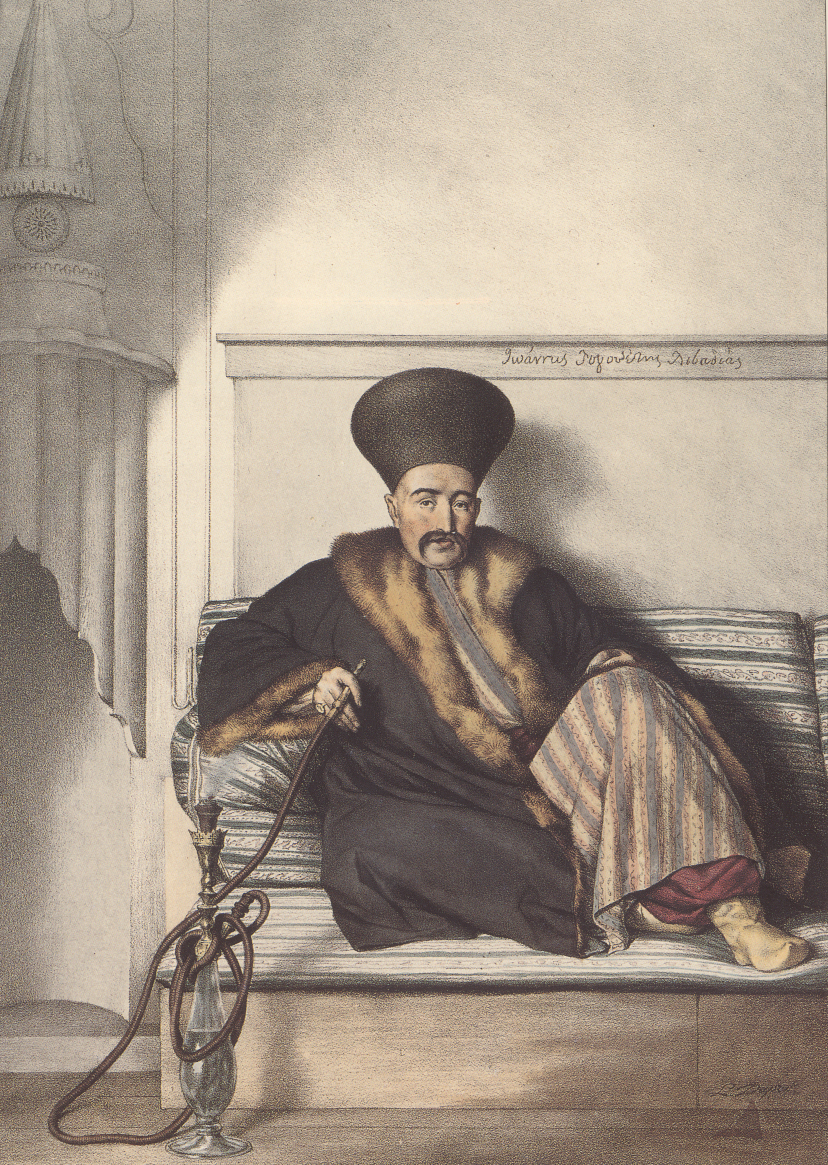Kodjabashi on:
[Wikipedia]
[Google]
[Amazon]
 The kodjabashis ( el, κοτζαμπάσηδες, kotzabasides; singular κοτζάμπασης, ''kotzabasis''; sh, kodžobaša, kodžabaša; from tr, kocabaṣı, hocabaṣı) were local Christian notables in parts of the Ottoman Balkans, most often referring to Ottoman Greece and especially the
The kodjabashis ( el, κοτζαμπάσηδες, kotzabasides; singular κοτζάμπασης, ''kotzabasis''; sh, kodžobaša, kodžabaša; from tr, kocabaṣı, hocabaṣı) were local Christian notables in parts of the Ottoman Balkans, most often referring to Ottoman Greece and especially the
 The kodjabashis ( el, κοτζαμπάσηδες, kotzabasides; singular κοτζάμπασης, ''kotzabasis''; sh, kodžobaša, kodžabaša; from tr, kocabaṣı, hocabaṣı) were local Christian notables in parts of the Ottoman Balkans, most often referring to Ottoman Greece and especially the
The kodjabashis ( el, κοτζαμπάσηδες, kotzabasides; singular κοτζάμπασης, ''kotzabasis''; sh, kodžobaša, kodžabaša; from tr, kocabaṣı, hocabaṣı) were local Christian notables in parts of the Ottoman Balkans, most often referring to Ottoman Greece and especially the Peloponnese
The Peloponnese (), Peloponnesus (; el, Πελοπόννησος, Pelopónnēsos,(), or Morea is a peninsula and geographic region in southern Greece. It is connected to the central part of the country by the Isthmus of Corinth land bridge which ...
. They were also known in Greek as ''proestoi'' or ''prokritoi'' (προεστοί/πρόκριτοι, "primates") or ''demogerontes'' (δημογέροντες, "elders of the people"). In some places they were elected (such in the islands for example), but, especially in the Peloponnese, they soon became a hereditary oligarchy
Oligarchy (; ) is a conceptual form of power structure in which power rests with a small number of people. These people may or may not be distinguished by one or several characteristics, such as nobility, fame, wealth, education, or corporate ...
, who exercised considerable influence and held posts in the Ottoman administration.
The title was also present in Ottoman Serbia and Bosnia
Bosnia and Herzegovina ( sh, / , ), abbreviated BiH () or B&H, sometimes called Bosnia–Herzegovina and Pars pro toto#Geography, often known informally as Bosnia, is a country at the crossroads of Southern Europe, south and southeast Euro ...
, where it was known as ''starešina'' ("elder, chief") instead of the official Turkish name. The terms '' chorbaji'' (from Turkish ''çorbacı'') and '' knez'' (a Slavic title) were also used for this type of primates, in Bulgaria and Serbia respectively.
The equivalent of the kodjabashis in Orthodox villages was the '' mukhtar'' in Muslim villages, while mixed villages had both.
During the Greek War of Independence
The Greek War of Independence, also known as the Greek Revolution or the Greek Revolution of 1821, was a successful war of independence by Greek revolutionaries against the Ottoman Empire between 1821 and 1829. The Greeks were later assisted by ...
, the antagonism between the Peloponnesian kodjabashis, who sought to retain their previous preponderance and power, and the military leaders drawn from the klephts
Klephts (; Greek κλέφτης, ''kléftis'', pl. κλέφτες, ''kléftes'', which means "thieves" and perhaps originally meant just "brigand": "Other Greeks, taking to the mountains, became unofficial, self-appointed armatoles and were kno ...
, was one of the main driving forces behind the outbreak of the Greek civil wars of 1824–1825, in which the "aristocratic" faction comprising the kodjabashis, the wealthy shipowners of Hydra and the Phanariotes, prevailed.
See also
* Obor-knez *Rum Millet
Rūm millet (millet-i Rûm), or "''Roman nation''", was the name of the Eastern Orthodox Christian community in the Ottoman Empire. Despite being subordinated within the Ottoman political system, the community maintained a certain internal auto ...
References
Sources
* *{{cite book, last=Zakythenos, first=Dionysios A., author-link=Dionysios A. Zakythenos, title=The Making of Modern Greece: From Byzantium to Independence, url=https://books.google.com/books?id=zoKgAAAAMAAJ, year=1976, publisher=Rowman and Littlefield, isbn=978-0-87471-796-9 Oligarchy Ottoman Greece Government of the Ottoman Empire Turkish words and phrases Christians from the Ottoman Empire Ottoman titles Ottoman-era Greek primates